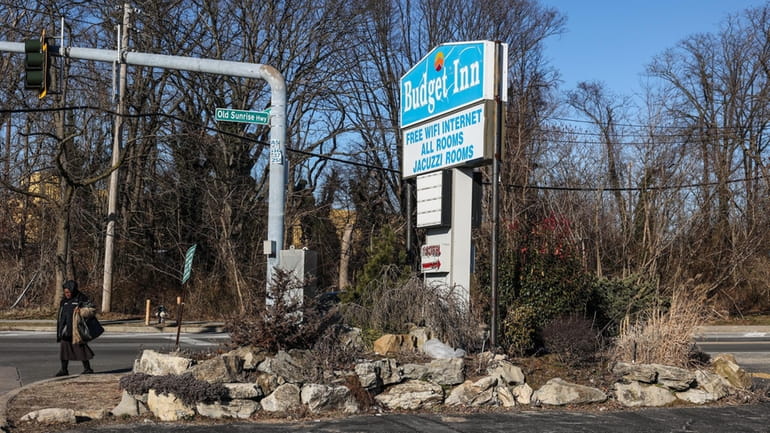Budget Inn owners file suit against Oyster Bay over town's repeal of business permits, occupancy certificates

The Town of Oyster Bay revoked the business permits and certificates of occupancy from the Budget Inn in Massapequa. Credit: Newsday/Steve Pfost
The owners of a Massapequa motel shuttered by a State Supreme Court judge filed a lawsuit against Oyster Bay after the town revoked its business permits and certificates of occupancy.
The suit argues the town violated its own code and was excessive when it rescinded those documents. Oyster Bay officials could “simply suspend rather than revoke the certificates of Occupancy and Building Permits,” says the suit, which seeks reimbursement for damages suffered as a result of the town’s lawsuit that effectively shut down the Budget Inn motel.
The filing, known as an article 78 petition, is a special legal instrument designed to either compel or stop a government action.
The town sued Om Shiv Sai Guru Inc., the owners of the motel, in State Supreme Court in February, seeking a temporary restraining order to stop the Carman Mill Road property from operating as a hotel or motel. The town said the property violated town code and had been a persistent nuisance in the community.
Judge Conrad Singer sided with the town on Feb. 21, temporarily shutting down the motel. However, he initially granted a stipulation that allowed the motel to continue housing people sent there by the Nassau County Department of Social Services, which accounted for about 80% of the motel’s business, court documents show.
On Feb. 28, the town’s outside consulting engineer, Cashin Spinelli & Ferretti, inspected the property and found numerous hazards, including exposed wiring, faulty fire alarms, mold and a locked door leading outside, according to court documents.
Chris Boyle, a Nassau County spokesman, said in an email on March 13 that the county moved all of its clients from the location to other housing. The county had lodged people in motel rooms for $120 per night.
The judge, in an order issued on April 24, removed the carve out for Department of Social Services clients.
Kevin O’Brien, an attorney for the motel, said in court documents that revoking the property’s permits and certificates of occupancy violated the town's own code because that action requires the property owners to make a “false statement or misrepresentation” about the use of the documents.
The petition said removing the property’s permits and certificates of occupancy would effectively put the motel out of business or severely delay its reopening.
To use or improve the site, the owners would have to appear before the Oyster Bay Town Board, “which is seeking to close the Petitioner's business,” O'Brien wrote in the filing.
O'Brien declined to comment on the case, citing pending litigation.
Oyster Bay Supervisor Joseph Saladino said in a statement the motel “has been an enormous problem for the community, our residents and the families and children living at the motel.”
“We will continue to create a higher level of safety for all,” he said.
The owners of a Massapequa motel shuttered by a State Supreme Court judge filed a lawsuit against Oyster Bay after the town revoked its business permits and certificates of occupancy.
The suit argues the town violated its own code and was excessive when it rescinded those documents. Oyster Bay officials could “simply suspend rather than revoke the certificates of Occupancy and Building Permits,” says the suit, which seeks reimbursement for damages suffered as a result of the town’s lawsuit that effectively shut down the Budget Inn motel.
The filing, known as an article 78 petition, is a special legal instrument designed to either compel or stop a government action.
The town sued Om Shiv Sai Guru Inc., the owners of the motel, in State Supreme Court in February, seeking a temporary restraining order to stop the Carman Mill Road property from operating as a hotel or motel. The town said the property violated town code and had been a persistent nuisance in the community.
Judge Conrad Singer sided with the town on Feb. 21, temporarily shutting down the motel. However, he initially granted a stipulation that allowed the motel to continue housing people sent there by the Nassau County Department of Social Services, which accounted for about 80% of the motel’s business, court documents show.
On Feb. 28, the town’s outside consulting engineer, Cashin Spinelli & Ferretti, inspected the property and found numerous hazards, including exposed wiring, faulty fire alarms, mold and a locked door leading outside, according to court documents.
Chris Boyle, a Nassau County spokesman, said in an email on March 13 that the county moved all of its clients from the location to other housing. The county had lodged people in motel rooms for $120 per night.
The judge, in an order issued on April 24, removed the carve out for Department of Social Services clients.
Kevin O’Brien, an attorney for the motel, said in court documents that revoking the property’s permits and certificates of occupancy violated the town's own code because that action requires the property owners to make a “false statement or misrepresentation” about the use of the documents.
The petition said removing the property’s permits and certificates of occupancy would effectively put the motel out of business or severely delay its reopening.
To use or improve the site, the owners would have to appear before the Oyster Bay Town Board, “which is seeking to close the Petitioner's business,” O'Brien wrote in the filing.
O'Brien declined to comment on the case, citing pending litigation.
Oyster Bay Supervisor Joseph Saladino said in a statement the motel “has been an enormous problem for the community, our residents and the families and children living at the motel.”
“We will continue to create a higher level of safety for all,” he said.

